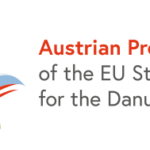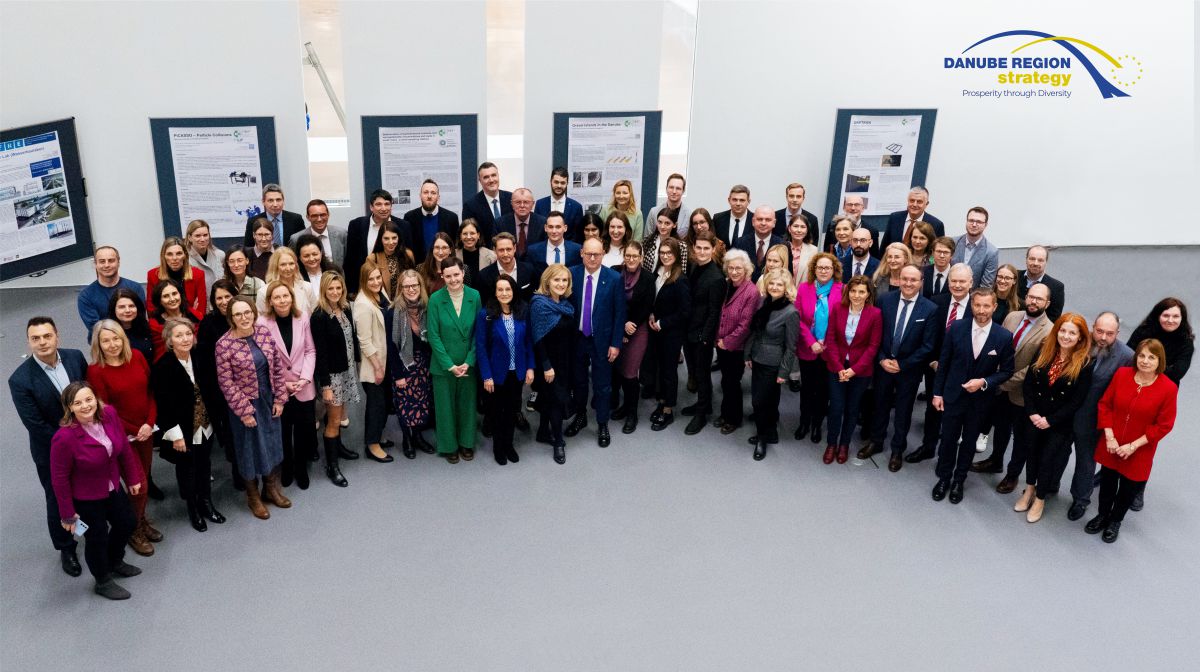© Austrian Federal Ministry for European and International Affairs
On 29 and 30 January 2024, the Austrian EUSDR Presidency organised the first meeting of the EUSDR core-governance stakeholders in Vienna, at BOKU University.
During the first day of the meeting, the agenda focused on the priorities of the EUSDR Austrian Presidency, updates from the European Commission, the Danube Strategy Point’s support provided to all the core-stakeholders, the activity of the Danube Youth Council during the current year, open exchange on recent developments in the Danube Region, the current state of the “EUSDR as a Laboratory for Accession” and the status-quo of the calls organised by the Danube Region Programme.
Under the Austrian EUSDR Presidency’s slogan 𝗦𝗵𝗮𝗽𝗶𝗻𝗴 𝗧𝗿𝗮𝗻𝘀𝗳𝗼𝗿𝗺𝗮𝘁𝗶𝗼𝗻, 𝗖𝗿𝗲𝗮𝘁𝗶𝗻𝗴 𝗢𝗽𝗽𝗼𝗿𝘁𝘂𝗻𝗶𝘁𝗶𝗲𝘀: 𝗔 𝗣𝗿𝗼𝘀𝗽𝗲𝗿𝗼𝘂𝘀, 𝗥𝗲𝘀𝗶𝗹𝗶𝗲𝗻𝘁 𝗮𝗻𝗱 𝗦𝗲𝗰𝘂𝗿𝗲 𝗗𝗮𝗻𝘂𝗯𝗲 𝗥𝗲𝗴𝗶𝗼𝗻, the representatives of the Presidency mentioned the importance of continuing the EU enlargement with Moldova, Ukraine and the Balkan countries, the business opportunities as key for increasing prosperity in the Danube Region, importance of cooperation on water management in relation to climate change, and youth inclusion. They also pointed out cooperation as a crucial element of policy making, considering national and thematic coordination leading to tackling challenges such as transposing the concept of cooperation into reality.
Johan Magnusson, European Commission, mentioned the Interreg post-2027 consultation process, the 5th EU Macro-Regional and Sea Basin Strategies Days (12-13 June 2024) and the draft of the 5th Report from the Commission on the implementation of EU macro-regional strategies, elaborated every 2 years.
The representatives of the Danube Youth Council detailed upon their future innovative plan within the council in relation to the implementation of EUSDR.
The open exchange session followed, as a new format session. This was organised as a response the EUSDR stakeholders’ request for more time dedicated to in-depth discussions. The session was developed as a dynamic exchange among stakeholders and approached topics like cooperation and partnerships, the importance of digital transformation, ecological concerns, climate change, capacity building in relation to the reconstruction and accession process of Ukraine and the Republic of Moldova, development if new innovative projects, the challenging global context and main topics deserving attention in the Danube Region, particularly brain drain and depopulation, transport and mobility, the importance of discussing post-2027 framework and the status of macro-regional strategies in Cohesion Policy.
During “EUSDR as a Laboratory for Accession”: EU Enlargement and Gradual Integration session, the representative of the European Commission, Thomas Hagleitner, expressed the importance of EU enlargement in view of current international developments, mentioning also a shift in the narrative of EU integration, since the concept of gradual integration became an alternative to a full EU integration. The EUSDR core-stakeholders highlighted the already supporting activities in the Danube Strategy fields and expressed their intention to better support the process of European integration for the non-EU countries in the Danube Region.
The session dedicated to the updates from the Danube Region Programme focused on the support provided to the applicants from Moldova and Ukraine, details on Seed Money Facility call, and the high number of newcomers among the projects in the 1st call for proposals.
The second day of the meeting started with an initiative of the Austrian EUSDR Presidency: “Future Perspectives for Macro-Regional Cooperation in the Danube Region post-2027”, when it was highlighted that 2024 provides an opportunity to reflect and contribute to the discourse on cohesion policy post 2027, before the negotiation phase starts, in 2025. The initiative aims as starting a reflection process, identifying key messages on macro-regional cooperation in the Danube Region post 2027. During the discussions, participants indicated their personal opinions and ideas on topics like the future EU policy relevant for the Danube Region, the future topics demanding increased cooperation, better utilised EU funding instruments and non-financial support to cooperation.
Another new format followed, as an open discussion. Organised in three different working groups participants developed upon establishing the Danube Youth Organisations Network (DYON), shaping the EUSDR Governance (Governance Architecture Paper: Concrete Understanding of Roles, Responsibilities and interlinks of NCs, PACs and SG members) and Just/fair and green transition.
The meeting ended with a brief presentation from DSP related to its current and upcoming activities and an outlook of the EUSDR Annual Forum and Meeting of Ministers 2024.





